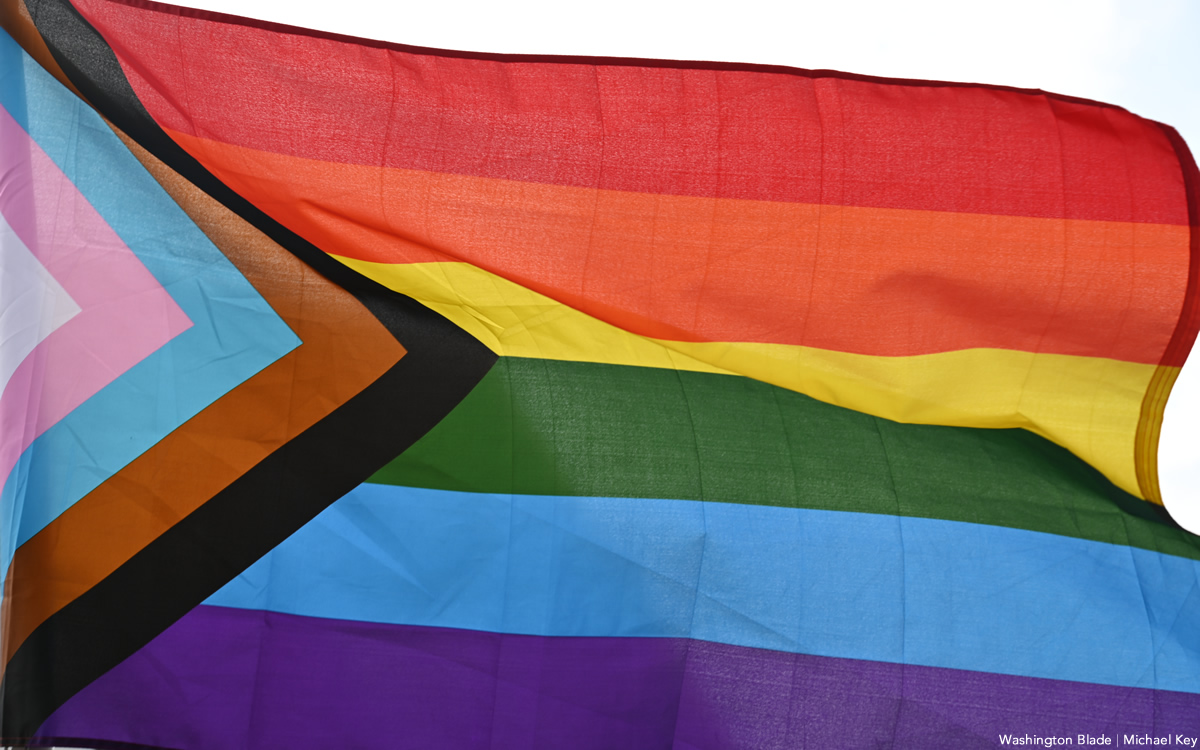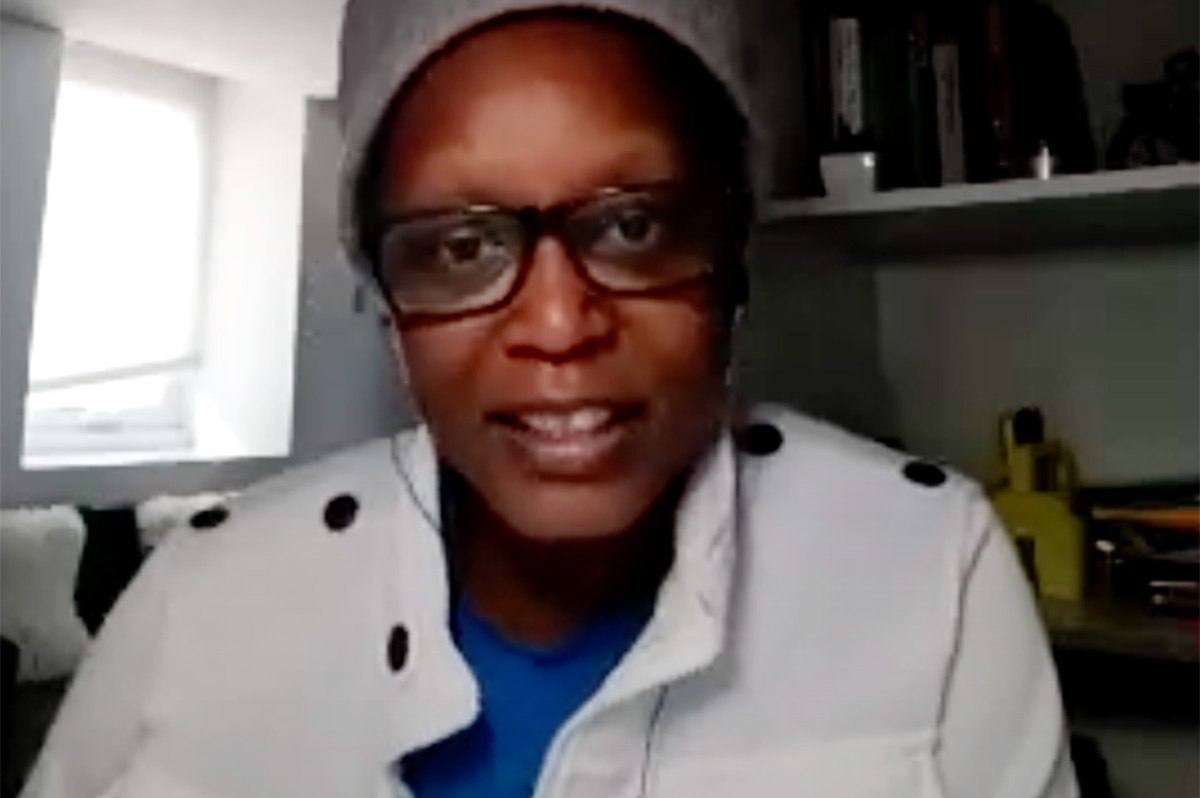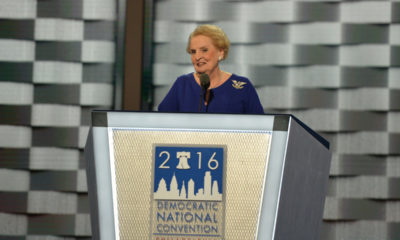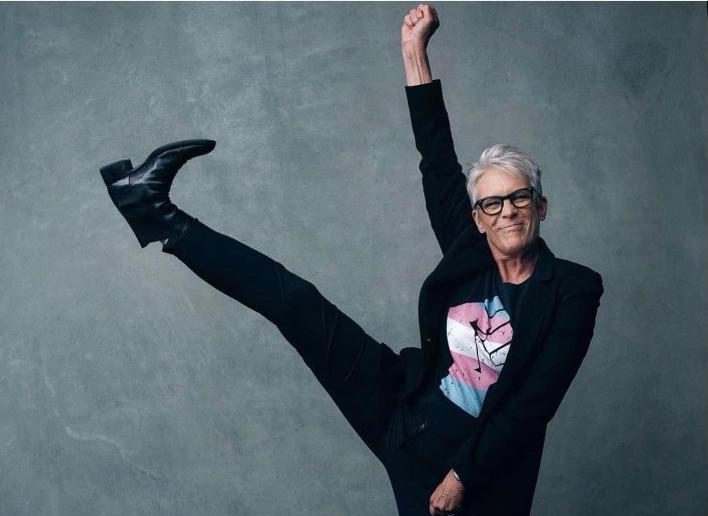Opinions
Reclaiming the word ‘ally’
Let’s not toss out the word; let’s focus on doing allyship right

The word “ally” has started to rub some folks the wrong way. It’s my understanding that some of the reasons why ally has gotten a nasty reputation are that self-professed “allies” either don’t do enough (i.e. they put an “I’m an ally pin” on their backpack and that’s all they do) or they use their power and privilege to speak over the community members they’re supposed to be supporting.
Mia McKenzie, author of “Black Girl Dangerous,” writes: “I will no longer use the term ‘ally’ to describe anyone. Instead, I’ll use the phrase ‘currently operating in solidarity with.’ Or something. I mean, yeah, it’s clunky as hell. But it gets at something that the label of ‘ally’ just doesn’t.” It’s true; “currently operating in solidarity with” is clunky as hell, but you may have noticed that other words have started to pop up to replace ally or to indicate people who offer higher levels of commitment and better-informed actions than the average “ally.” A few examples are accomplice, advocate, and co-conspirator.
I’m absolutely fascinated by this development. I’ve read many articles and blogs about these different terms, trying to understand what they all mean and how they should be applied, and I keep coming back to the same thought: None of these new words would be needed if allyship were being done well. “Ally” is becoming a word with negative implications because allyship is being done poorly by so many. We don’t need any more terms to describe allies or differentiate levels of action and commitment. We need to put our energy into allying better. So, if you consider yourself an ally to the LGBTQ communities, here are some tips to follow that will ensure that your ally efforts are spot on.
• When you’re in LGBTQ spaces, meetings, and events, listen and learn. If you got involved in social justice work to support marginalized communities in creating the change they see as necessary, then you need to let the people in those communities lead the way in deciding what that change should look like.
• Be mindful of the fact that you’re part of the movement, not part of the community. Assume the “A” in “LGBTQIA” stands for asexual, not ally.
• Respect LGBTQ-only spaces. If you aren’t sure if allies are welcome, call and ask.
• When out on your own, do some of the heavy lifting. For example, reach out to the leaders in your school district to advocate for a single graduation gown color, rather than different colors for boys and girls.
• When you mess up (i.e. accidentally say something offensive) thank the person who brings your error to your attention and make an appropriate apology, without making excuses for your behavior or getting defensive. Few people enjoy telling others that they messed up. If someone is letting you know that you made an error, it probably means that they value your relationship, have faith that you’re interested in learning, and believe that you’re capable of listening and changing your behavior. Accept this intervention for the compliment that it is and thank the person for committing to an action that’s no fun for anyone. Then let them know you intend to do better.
• Learn as you go. Try not to get bogged down or discouraged by how much you don’t know. Look up new words, learn about new concepts, and investigate new trends as they arise.
• One final pointer is to realize that there are no hard and fast guidelines for when an ally should step in with action and when they shouldn’t. Allyship is a bit of a balancing act. Whether or not you take action as an ally should depend on the situation and the people involved.
Most folks agree that we should help carry the dirty dishes to the kitchen after dinner. Most folks also agree that we shouldn’t scrub our host’s toilet, even if it’s a mess. But loading our host’s dishwasher is kind of a gray area. Our decision is likely to depend on how well we know the host and social cues we’re picking up from the environment.
The same is true with allyship. Some actions are clearly good choices, for example, suggesting that your doctor’s office update their forms when you see the limited “M” or “F” choices. Some actions are clearly bad choices, for example, speaking over the community members you’re trying to support. And then there are gray areas.
An example of a gray area of allyship is when someone uses the wrong gendered term for (i.e. misgenders) one of your coworkers in a work meeting. In a situation like this, you’ll need to make a judgment call about whether to step in or not depending on several factors. You’ll need to consider factors like how well you know the coworker who was misgendered, whether you think the person will appreciate the support or be made uncomfortable by having attention drawn to the mistake, and how past efforts to support this coworker have been received. You’ll also need to think about who else is at the table during the meeting. Is it all folks that everyone knows and trusts or are there new people at the table? If the latter, safety and confidentiality may be at risk if you speak up.
Whether you choose to say something or not, a great ally action when you encounter a gray area is to check in later, privately, with the person who was affected. You can say something like, “I wasn’t sure how to respond when you were misgendered in the meeting today. If that happens again, how can I best support you?” Communication is key. The next time this situation occurs with this coworker, you’ll know exactly how to respond. If you chose not to say anything in the meeting, you may also want to ask if there’s a role you can play in speaking with the person who messed up. That way you can be proactive in preventing the mistake from occurring again.
In her essay “Fluid and Imperfect Ally Positioning: Some Gifts of Queer Theory,” Vikki Reynolds writes, “I am always becoming an ally. I am continually being woken up to my locations of privilege.” Thinking of the word ally as a verb, rather than who we are, helps us remember that being an ally is about action. It’s not a static identity that we wear on a badge: “Tada! I made it! Pop the Champagne! I’m an ally!” Becoming an ally is a never-ending process.
Let’s not toss out the word ally and replace it with other words that may or may not improve people’s understanding of effective allyship. Let’s simply focus on doing allyship right.
Jeannie Gainsburg is an award-winning educational trainer and consultant in the field of LGBTQ inclusion and effective allyship. Formerly the Education Director at the Out Alliance of Rochester, N.Y., she is the founder of Savvy Ally Action and author of the book, ‘The Savvy Ally: A Guide for Becoming a Skilled LGBTQ+ Advocate.’
Opinions
D.C. leaders must show up for LGBTQ+ communities
Silence is not an option amid relentless attacks

At a time when D.C. and the LGBTQ+ community are under relentless attack, we cannot afford silence — or inaction. The DC LGBTQ+ Budget Coalition, a grassroots alliance of more than 20 LGBTQ-led and LGBTQ-serving organizations and individuals, is calling on Mayor Bowser, the D.C. Council, and every level of D.C. government to act with urgency and purpose in this year’s budget process to invest in our community. Our lives, our futures, and our rights are on the line — not just nationally, but here at home in the District. How D.C. as a city responds in the face of hate sends a powerful message to the rest of the country.
We formed this coalition because LGBTQ+ people in the District — especially Black, Brown, trans, disabled, and low-income residents — deserve more than token inclusion. We deserve policies, investments, and leadership that center our lived realities and deliver on equity. While Congress tries to strip D.C. of home rule and holds our budget hostage, our local government has the power — and responsibility — to lead.
We are not a performative alliance. We are a community-driven movement. From housing to healthcare to workforce development, we believe budgets are moral documents — and D.C.’s budget must reflect the values of equity, justice, and liberation.
National Context Demands Local Action
Just this year, members of Congress introduced damaging legislation to reverse D.C.’s home rule, stripping District residents of the fundamental rights of self-governance enjoyed by their own constituents. Additionally, the White House seeks to rule over us by executive order, issuing edicts to overturn our laws. Adding further insult to injury, extremists in the House of Representatives are holding $1.1 billion of D.C.’s own tax revenue hostage to their radical anti-democratic agenda.
Moreover, this administration continues its assault on diversity, equity, and inclusion initiatives, undermining civil rights protections across the country. We are not simply witnessing bureaucratic shifts; we are standing at the edge of a cliff, staring down a coordinated rollback of the very protections our communities have bled to secure.
Veterans of past queer liberation fights remind us that we’ve been here before. From the Lavender Scare to Stonewall to ACT UP, from the fight for marriage equality to the ongoing battle for trans rights, queer warriors have long known what it means to survive government neglect, societal backlash, and moral panic. Their testimonies warn us: This moment is severe. This moment is familiar. And this moment requires us to act.
These are not theoretical attacks. They are strategic, structural, and escalating. In this context, D.C. must serve as a model for sanctuary, resilience, and resistance. That means investing in communities — not abandoning them.
We know that our local leadership has, at times, moved preemptively to comply with federal executive orders — even when those directives run counter to our values. And while the mayor has publicly affirmed equity, housing, and inclusivity as core priorities, this moment demands more than words. We call on the mayor and District leaders to stand firm in those stated commitments and meet this moment with the clarity in the District’s budget. D.C. must not be a conduit for federal overreach, but a bulwark against it.
Our FY26 Priorities
In this year’s budget, we’re calling for the D.C. government to protect targeted investments in:
• Public Health: Restore and expand local funding to fill the dangerous gaps left by federal cuts to HIV prevention and mental health services. Ensure culturally competent care for LGBTQ+ residents, especially those with disabilities and chronic health conditions.
• Employment and Economic Equity: Sustain and grow workforce development programs for trans and gender-diverse (TGD) residents. Expand partnerships with employers and support entrepreneurial training by and for the TGD community.
• Housing: Invest in long-term housing solutions, including for LGBTQ+ youth and seniors, and protect programs like Emergency Rental Assistance Program (ERAP) and Tenant Opportunity to Purchase Act (TOPA) that keep people residents housed.
• Safety and Community Support: Fund LGBTQ+ survivor shelters and IPV/SA services, ensure disability and language access, and streamline government grant processes for community-based organizations.
We’ve outlined these and other priorities in our full FY26 Budget and Policy Platform, recently delivered to the Mayor and D.C. Council. But we know that a letter alone isn’t enough—we must take action.
We’re Organizing — and We’re Not Alone
In this past week, we launched a letter-writing campaign to mobilize D.C. residents to urge their Council members to prioritize LGBTQ+ budget needs. We are also releasing a citywide sign-on letter for partner coalitions and ally organizations to demand the same.
Our members are showing up at budget hearings, meeting with agencies, and organizing communities across all eight wards. And while we’re proud of the momentum, we need our community to join us. We need every resident, organization, and elected leader to get in this fight.
How You Can Get Involved
Here’s how you can join the movement:
• Individuals: Sign our Action Network letter to Council members and the Mayor.
• Testify or submit written testimony at budget hearings to uplift our priorities.
• Call and email your Council members — demand full inclusion of LGBTQ+ needs in the FY26 budget.
Together, we can ensure that D.C.’s budget reflects the lived realities and urgent needs of LGBTQ+ communities across all eight wards.
The question before D.C.’s leaders is clear: Will you choose to look the other way or will you join us in taking action?
Heidi Ellis is coordinator of the DC LGBTQ+ Budget Coalition. Erin Whelan is executive director of SMYAL (coalition member).
Opinions
LGBTQ elder voices matter now more than ever
Global Story Archive highlights often ignored perspectives

Kasha Nabagesera is widely regarded as the Mother of the Ugandan LGBTQ+ human rights movement. As one of the most prominent human rights activists of our time, she is no stranger to speaking publicly about her life. However, when I had the privilege of sitting down with her this February, she opened up about a part of her story that is often overlooked—or, even worse, ridiculed. Aging.
When Kasha turned 40, she began to notice a shift in how people viewed and spoke about her lived experience. In the years since, she has received hurtful and dismissive messages from younger LGBTQ+ people who believe her age renders her opinions and perspective irrelevant. These individuals fail to recognize that the sacrifices made by Kasha and other elders have paved the way for today’s young queer people to live their lives openly and proudly.
Disregard for LGBTQ+ elders is not just disrespectful—it’s a missed opportunity for connection at a time when solidarity among LGBTQ+ people is desperately needed. The number of anti-LGBTQ+ bills continues to rise in state legislatures across the U.S., and about one-third of the world’s countries, including 60 UN member states, still criminalize consensual same-sex sexual acts.
The reality is that our elders are true pioneers of the LGBTQ+ movement worldwide. They have survived decades of discrimination and state-sanctioned violence, leading them to face many unique challenges.
Many report having to “go back into the closet” to access care in later years, lack family support networks, and discrimination in housing and healthcare. LGBTQ+ older adults are also less likely to have retirement savings due to decades of employment discrimination.
Through these struggles, LGBTQ+ elders have developed remarkable wisdom, and their lived experiences can provide a roadmap for resilience in the face of new obstacles. But too often, we fail to listen to them, and their contributors are forgotten.
Over the last three and a half years as director of International Programs at SAGE, I have spoken with hundreds of elders worldwide about their lives and legacies. Most have shared similar experiences of ageism and a desire to pass on their knowledge to younger generations.
One of those elders is Reingard Wagnar, a 74-year-old lesbian and activist from Germany. She said that not only are older women in society rendered invisible anyway, but it is especially true for older lesbians. She wants people to know that elder LGBTQ+ folks are here, and they have much to share.
Another elder I had the honor of meeting, Kevin Mchawiro, is a Kenyan journalist and believes stories can also serve as a source of inspiration and that love does indeed win.
To collect, preserve, share and amplify the stories of elders like Kasha, Reingard, and Kevin, I created The Global Story Archive. Supported by SAGE and in collaboration with a global network of not-for-profit organizations and independent activists, this first-of-its-kind collection features the voices of dozens of LGBTQ+ elders who are eager to share their perspectives across generations and borders.
However, in the wake of Trump’s Executive Orders on Foreign Aid, the uncertainty of where funding and support lies, and what the future looks like, SAGE must close its global operations. This suspension is happening in tandem with the dismantling of foreign aid programs that advance the well-being of other underserved populations, including immigrants, women, and those burdened by disease.
The loss extends beyond funding cuts or policy shifts; it represents the erosion of programs that have fostered solidarity and advanced the well-being of us all.
If you find yourself asking how to find resilience in this turmoil, the answer is simple: look to our elders. Our international community of LGBTQ+ elders has lived through and witnessed moments of upheaval, tragedy, and triumph, and they hold priceless knowledge to counsel younger generations through hardship.
The state of the world is uncertain, but as elders will tell you, it can get better.
To hear and learn from the voices of our global community of LGBTQ+ elders, please visit The Global Story Archive.
Hannah Yore is an international health and human rights advocate with expertise in aging, care work, and LGBTIQ human rights. She is the former director of International Programs at SAGE and is a dedicated palliative care and end-of-life doula.
Opinions
It’s time for new leadership on the Maryland LGBTQIA+ Commission
TDOV stunt disrespected Gov. Moore and his record of trans support

On March 31, what should have been a day of collective celebration and power for Maryland’s transgender community, Transgender Day of Visibility was instead hijacked by public hostility toward Maryland Gov. Wes Moore. The verbal attack was out of line, disrespectful, and did nothing to move us closer to justice. FreeState Justice did not applaud. We did not stand. We know the difference between holding power accountable and performing outrage without an actionable plan.
Let’s be honest: the Moore-Miller administration and the LGBTQIA+ legislative caucus have shown up for our community in ways that matter. From the signing of the Trans Health Equity Act to the launch of the first-in-the-nation ‘Trevor Train the Trainer’ suicide prevention initiative with The Trevor Project, a program that equips individuals to train others in suicide prevention techniques, this administration has made meaningful, measurable investments in the lives of LGBTQIA+ Marylanders.
The Governor’s proposed FY26 budget didn’t just protect access to gender-affirming care—it doubled on hate crime prevention and increased support for community centers doing the work. This is what leadership looks like. It’s not just symbolism—it’s dollars, policy, access, and intention. And it bears repeating: Gov. Wes Moore is the first Black governor of Maryland. His leadership holds particular significance for those of us who live at the intersection of racial, gender, and queer identities. Understanding intersectionality is not optional—it is essential if we are serious about liberation for all LGBTQIA+ people, especially those who are Black, Brown, and historically marginalized.
What we experienced on March 31 was the opposite. It was disorganized, divisive, and frankly, disappointing. FreeState Justice has not had a working relationship with the current Maryland Commission on LGBTQIA+ Affairs, a body that is supposed to represent and advocate for our community’s needs. The Commission has not come to the table with a legislative or budgetary request. There has been no coordinated policy agenda. There has been no coalition-building. There has been no community-informed process. That matters.
If your goals are equity and inclusion, your work must be transparent and collaborative. Not ambush tactics like sudden changes in event format or last-minute planning that leave key stakeholders out of the loop. The TDOV event, coordinated by the Commission and a few community members at the eleventh hour, lacked the strategic groundwork our community needs and deserves. It was self-serving and dishonest.
It’s particularly disheartening to contrast this with what we accomplished two years ago when the governor made history by recognizing Transgender Day of Visibility inside the State House. He led the charge. We were proud to stand with him then—and we still are.
We honored a moment that acknowledged not just trans identity, but also racial equity and our collective history of struggle. To witness that same governor, who had previously met with this Commission openly and respectfully, be publicly ridiculed without acknowledgment of his administration’s historic support was a failure of leadership—not on his part, but on those who opted for conflict instead of fostering community.
Let’s be clear: we’re not saying don’t challenge power. We’re saying do it with purpose. Do it with facts. Do it with a strategy. If you’re going to call yourself a leader in this movement, show us the policy platform. Show us the data. Show us the budget line. Show us the work.
At FreeState Justice, we’ve done that, and we will continue to do that. We’ve applied—and will keep applying—for state dollars through the Governor’s Office of Crime Prevention, Youth, and Victim Services. Why? Because those grants help us serve survivors of domestic violence, LGBTQIA+ youth, victims of hate crimes, and people impacted by community violence. Many of whom are people of color. This is where real change happens—at the intersection of advocacy, accountability, and access.
It’s time for new leadership on the Maryland LGBTQIA+ Commission. Leadership that values and prioritizes coalition over conflict. Leadership that invites feedback and shares power. Leadership that understands how Annapolis operates, how budgets are constructed, and how community victories are won—not demanded. The urgency for this change is palpable and should resonate with everyone who cares about our community.
We know the stories. We know the statistics. Now we need a Commission willing to put in the work with all of us—not just a chosen few. This collective effort is crucial for the progress of our community and should be felt by all who are part of it.
Maryland’s transgender community deserves more than fleeting moments; we deserve ongoing movement.
Lauren Pruitt is legal director of FreeState Justice; Ronnie L. Taylor is the group’s Advocacy, Policy, & Partnerships Director.
-

 District of Columbia5 days ago
District of Columbia5 days agoWorldPride organizers may warn trans people from abroad not to attend event
-

 Opinions4 days ago
Opinions4 days agoIt’s time for new leadership on the Maryland LGBTQIA+ Commission
-

 The White House3 days ago
The White House3 days agoWhite House does not ‘respond’ to reporters’ requests with pronouns included
-

 Noticias en Español4 days ago
Noticias en Español4 days agoINDIGNACIÓN: ¡El transfeminicidio de Sara Millerey en Colombia nos cuestiona como sociedad!











